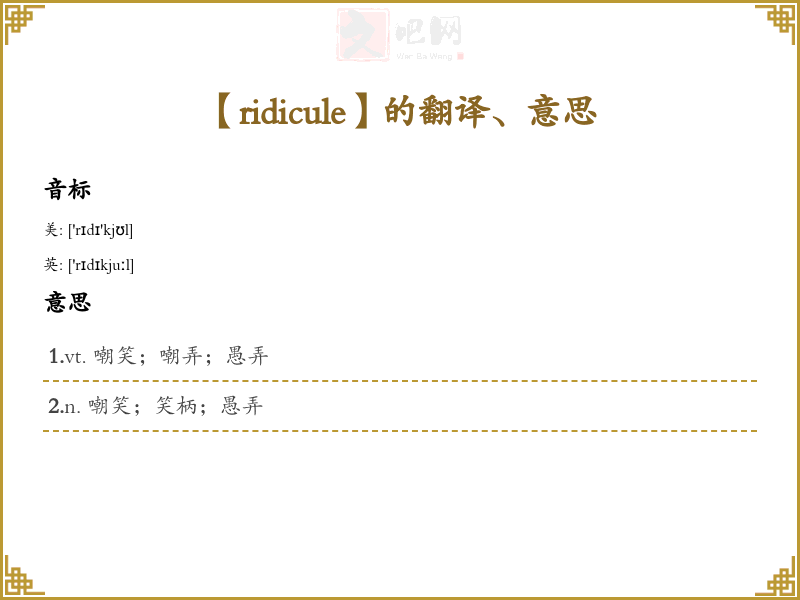【ridicule】的翻译、意思
时间: 2025-03-04 14:28:42
【ridicule】怎么读
美:['rɪdɪ'kjʊl]
英:['rɪdɪkjuːl]
【ridicule】是什么意思、字义解释
1. vt. 嘲笑;嘲弄;愚弄
2. n. 嘲笑;笑柄;愚弄
【ridicule】等级考试
TEM4 ( ridiculing, ridiculed, ridicules )
【ridicule】的详细解释
英文单词学*与分析:[ridicule]
1. 基本定义:
- 字面意思:Ridicule意为嘲笑或取笑,指对某人或某事的轻蔑或不尊重的态度,尤其是通过夸张或讽刺手法。
- 词性:名词和动词。
2. 词源与起源:
- 词源分析:Ridicule来源于拉丁语“ridiculum”,意为“可笑的事物”,其词根“ridere”意为“笑”。
- 历史背景:该词首次出现在1*世纪,用于描述对某个人或事物的讽刺和嘲笑,常见于文学作品中。
3. 使用场景:
-
正式与非正式语境:
- 正式:在学术文章或辩论中,ridicule常用于讨论对某些观点或理论的批评。
- 非正式:在日常对话中,人们可能用ridicule来描述朋友之间的玩笑或轻松的嘲讽。
- 引证解释:在《1984》中,乔治·奥威尔提到对政府的ridicule,表现了对权威的质疑。
-
特殊场合:在法律领域,ridicule可能被用于描述法庭上对某一方的轻视态度;在艺术领域,ridicule常见于讽刺作品和喜剧中,用于探讨社会问题。
4. 示例句子:
-
His ideas were met with ridicule by his peers.
他的想法遭到了同龄人的嘲笑。 -
The comedian used ridicule to highlight the absurdities of everyday life.
这位喜剧演员用嘲讽来强调日常生活的荒谬之处。 -
She felt a sense of ridicule when she realized her mistake.
当她意识到自己的错误时,感到有些可笑。 -
The film was criticized for its ridicule of certain social issues.
这部电影因对某些社会问题的嘲讽而受到批评。 -
He was subjected to ridicule for his unusual fashion choices.
他因其不寻常的时尚选择而遭到嘲笑。
5. 同义词与反义词:
-
同义词:
- Mockery:通常指嘲笑或讽刺,更多强调模仿。
- Derision:表示轻蔑的嘲笑,常伴有讽刺。
-
反义词:
- Respect:尊重,表示对某人或某事的肯定态度。
- Admiration:钦佩,表示对某人的赞赏与赞美。
. 学方法:
- 音标记忆法:/ˈrɪdɪˌkjuːl/,可以通过反复朗读这个单词,帮助记忆其发音。
- 词根记忆法:记住词根“ridere”(笑)可以帮助联想该词的意义,即与笑有关的嘲讽。
- 谐音联想记忆:可以联想“ridicule”与“ridiculous” (可笑的),帮助记忆其含义。
7. 关联词汇:
- Mock
- Deride
- Satire
- Scorn
- Disdain
通过以上分析和例句,学*者可以更好地理解和使用“ridicule”这个词,并在不同的语境中灵活应用。
【ridicule】例句
1、[V-T] If you ridicule someone or ridicule their ideas or beliefs, you make fun of them in an unkind way. 嘲笑
-
例:I admired her all the more for allowing them to ridicule her and never striking back.我更加钦佩她了,因为她能够容许让他们嘲笑她而从不回击。
2、[N-UNCOUNT] If someone or something is an object of ridicule or is held up to ridicule, someone makes fun of them in an unkind way. 嘲笑
-
例:As a heavy child, she became the object of ridicule from classmates.作为一个胖孩子,她成了同学们的笑柄。
